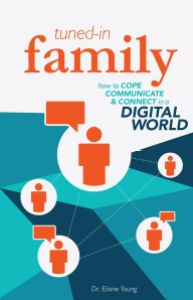
Begin with a simple but overwhelming fact. We live in the most mediated society in world history; we in the West are marinating in 10-12 hours of media experience daily. For many of us, the power and ubiquity of our 21st century media culture creates daunting challenges– especially for parents working to raise young children in this new digital media age.
Never fear! Tuned-In Family, a new book by Champlain College professor Elaine Young, offers a comprehensive and accessible road map for parents and families trying to sort out the complexities of living, working, and playing in our digital universe. Young is both a seasoned teacher AND mother, and, in a neat approach, she draws on both her personal and professional worlds in designing a three C blueprint – coping, communicating, and connecting – for parents looking for reasonable family-friendly media strategies. Be advised – Young does not adopt a “just say no” approach (what some media scholars have termed a “protectionist” strategy). Instead, she lays out a collaborative media-savvy partnership approach in which parents and kids work together with age appropriate strategies for navigating media content.
Young divides her book into three parts. The Introduction, entitled “Why You Need This Book,” explores the issues surrounding media use for “Generation Connected.” Young looks at the ways in which both kids and schools misunderstand digital media, and advocates for the creation of an intentional “digital footprint” (or “personal brand”), recognizing both the promises and pitfalls of new digital media. Part One of her book urges parents and families to adopt what she calls a “technology philosophy,” as well as an inventory of digital communication tools, an access plan, and some ground rules to which families can adhere. Finally, in Part Two, Young explores what she calls “Ages and Life Stages,” in which she charts family-friendly media strategies for considering kids’ media use during various life stages – the book’s most engaging and personal section, in my mind.
Towards her book’s end, Young writes the following, as a parent ushering her daughter into adulthood:
Use your social and communication tools now to stay connected in a positive manner. Strike a balance between letting go and staying informed but trust that you have set the right foundation for your digitally-savvy child as they become a digitally-savvy adult.
Great advice. Young’s book is chock-full of nuggets of wisdom like this one, as well as a more comprehensive strategic approach that every parent of a 21st century plugged-in kid will find useful.
Here’s an interview 2VR conducted with Elaine about her new book.
Q. How did you come to write TUNED IN FAMILY?
A. It really was what I call a “Passion Project.” As a professor, I was observing how my students were posting content. As a Mom, I was observing my daughter and her friends, and inevitably I would end up talking with friends and others with younger children and they would ask my advice. I decided it would be a good time to put all of that down and provide parents with a guidebook that might help them with the challenges they are facing in finding the right balance for their children.
Q. “Nutshell” your primary argument for us.
A. My emphasis in this book is that raising your children in a digital world requires turning your family into a learning community. Laying a foundation of respect and conversation from a very early age and modeling the behavior you want to see in your children. Try not to make striving for balance an adversarial issue, but rather help your children appreciate all the world has to offer and put technology in it’s rightful place in your home based on your family values. There is no right way. There is no wrong way. It is your families way.
Q. Many of us in the media education movement are fond of the phrase “media diet,” arguing that parents must support their kids in making healthy choices about their media experiences. What’s your “take” here?
A. I believe that each family needs to think intentionally about what a “media diet” means for them — not just their kids, but the whole family. Digital technologies fall under this as well. Engaging in meaningful conversations as a whole family about what that looks like for everyone while respecting the individual interests and passions of everyone in the family is not easy, but it has big rewards.
Q. What are the biggest challenges of our digital world, from a parent’s perspective?
A. Helping our children, and ourselves, cope with the speed at which things change. Essentially adapting to a world that often feels like it is moving so fast because we have 24/7 communication, and much of that communication is real time. The tools keep changing, privacy settings keep changing, and we never really feel like we are on solid footing.
Q. Are you hopeful?
A. I’m very hopeful. I think those of us who came of age during the initial introduction of computers and the internet into the schools and homes are probably the best equipped to help our children find the right balance. We remember pre-internet. We also have seen just how much digital technologies have helped us and changed our world right around us. We just can’t abdicate our role as parents and say, “I can’t keep up” or “My child knows better than I” because in reality we are all working through these transitions and changes together.
- All
- Agriculture
- Arts & Culture
- Book Reviews
- Civil Liberties
- Decentralism & The Vermont Tradition
- Education
- Empire and Overshoot
- Environment
- Featured Content
- Features
- Film Reviews
- Finance & Money
- Food
- Fuel & Energy
- Global Problems, Local Solutions
- Homestead Security
- Information & Media
- Interviews
- Military
- Most Likely to Secede
- Music Reviews
- Politics
- Resilience & Community
- Sovereignty & Secession
- Uncategorized
- Vermont Commons



You must be logged in to post a comment.